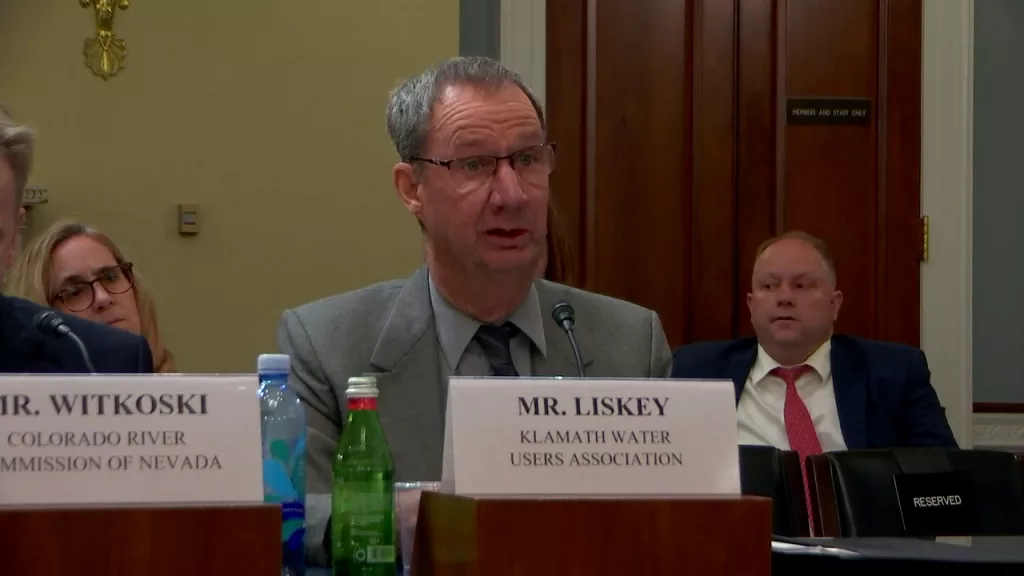KLAMATH FALLS, Ore. – For the second time this year, a representative from the Klamath Project has testified before Congress in Washington, D.C. This week, Klamath Water Users Association President and fourth-generation farmer Tracey Liskey testified before the Committee of Natural Resources Subcommittee on Water, Wildlife, and Fisheries.
Liskey testified on behalf of H.R. 7938, The Klamath Basin Water Agreement Support Act of 2024, introduced by Representative Cliff Bentz on April 11 of this year. As chairman of the subcommittee in the House of Representatives having jurisdiction over the U.S. Bureau of Reclamation, Representative Bentz conducted the hearing on the Klamath legislation and three other pending bills on May 22.
“This legislation will provide important tools and protections for farms and fish that are imminently needed, especially in light of the ongoing non-federal dam removal activities on the Klamath River,” stated Liskey. “The bill will also provide tools for agencies and irrigators to address ongoing challenges in the difficult circumstances of the Klamath River Basin.”
KWUA Executive Director Paul Simmons said that the bill in the House of Representatives is very similar to S. 482, which was introduced in the Senate by Senator Ron Wyden on behalf of himself and Senator Jeff Merkley in February 2023. “It’s encouraging to have bipartisan, bicameral support for these kinds of protections,” said Simmons.
Simmons also noted that Senator Wyden chairs the Senate subcommittee that oversees the U.S. Bureau of Reclamation. That subcommittee held a hearing on its bill in July 2023.
Both bills include measures to protect irrigation water users from the negative consequences of removing hydropower dams on the Klamath River. The legislation would shield Klamath Project irrigators from any responsibility for payment for the costs of operating, maintaining, or improving the Link River Dam or Keno Dam.
PacifiCorp historically paid the costs associated with these facilities, but Reclamation is in the process of taking them over.
The bills also authorized federally funded construction of fish screens or similar devices needed for introducing salmon above the Keno dam, which have not historically been necessary in the Klamath Basin. The bills would also address specific past and future costs for infrastructure that should be borne by the federal government rather than irrigators.
In his testimony, Liskey emphasized that over several years, KWUA and others received assurances from state and federal agencies, tribes, and conservation groups that dam removal would not negatively impact farmers and ranchers, and those promises need to be kept. Made by the Dept of Interior and other government officials. U.S. Bureau of Reclamation Deputy Commissioner David Palumbo, who testified on behalf of Reclamation, also acknowledged the need to honor those commitments.
“This week’s hearing was a necessary step to move forward. Much work remains, but we are on the playing field,” stated Simmons.
In addition, Simmons added, “KWUA President Tracey Liskey did a great job telling our story and spoke from the heart.”
A replay of the hearing can be watched at the link below.
https://www.youtube.com/live/6Igg27n8kn4?si=4Gz7-rWTSeOHVYtk
A copy of Liskey’s written testimony can be found at the link below.
https://www.kwua.org/wp-content/uploads/2024/05/05162024-Liskey-Written-Testimony-HR7938-00175636xD2C75.pdf

